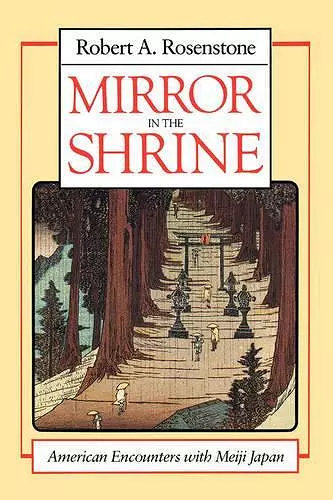Mirror in the Shrine
American Encounters with Meiji Japan
Format:Paperback
Publisher:Harvard University Press
Published:1st May '91
Currently unavailable, and unfortunately no date known when it will be back

Absolutely delightful, at first for its unspoiled picture of late-nineteenth-century Japan as seen through the eyes of three remarkable but very different Americans, [the missionary William Elliot Griffis, the scientist Edward S. Morse, and the writer Lafcadio Hearn], and then for the marvelous reconstruction of how Japan worked on their minds, radically changing their perceptions of the country and the whole relationship between East and West--between the barbarian and the civilized. The book is a tour de force -- Edwin O. Reischauer
In the last third of the nineteenth century, three Americans with diverse purposes sailed to Japan—the missionary William Elliot Griffis, the scientist Edward S. Morse, and the writer Lafcadio Hearn. They were to become part of the first generation of American experts on Japan, regularly quoted and widely read. More significantly, their own lives were vastly changed, broadened and enriched in unexpected ways, so that their thoughts dwelt as much on what Americans could learn from the pagan Japanese as on what Americans could teach them.
In telling these stories, Robert Rosenstone evokes the immediacy of daily experience in Meiji Japan, a nation still feudal in many of its habits yet captivating to Westerners for the gentleness of the people, the beauty of the landscape, the human scale of the unspoiled old towns, and the charm of arts and manners. He describes the odyssey of the ambitious and strong-minded Christian minister Griffis, who won few converts but, as a teacher, assisted at the birth of modern Japan. He portrays the natural scientist Morse, a born collector who turned from amassing mollusks to assembling comprehensive collections of Japanese folk art and pottery. He recounts Lafcadio Hearn’s fourteen years in Japan. Hearn, who married a Japanese, became a citizen, and found in his new homeland ideal subject matter for exotic tales of ghosts, demons, spectral lovers, local gods and heroes, spells, enchantments.
Rosenstone recreates the sights and textures of Meiji Japan, but Mirror in the Shrine brings to the reader much more than a traditional rendering. Rather, through the use of some of the techniques of modernist writing, the book provides a multi-voiced narrative in which the words of the present and the past interact to present a fresh view of historical reality. While charting the common stages of these three Americans’ acculturation—growing to like the food, the architecture, the spareness, the mysterious etiquette—the work also highlights the challenges that Japan issues to American culture, in this century as well as in the last: Is it possible to find human fulfillment within the confines of a hierarchical, even repressive, social order? Is it possible for our culture to find a place of importance for such qualities as harmony, aesthetics, morals, manners?
This is a...
A fascinating study of cross-cultural encounters, written with great empathy not only for the three men but for the culture and the people they loved. -- Kunio Francis Tanabe * Washington Post Book World *
Mirror in the Shrine does what we want historical biography to do: to speak through the sources and bring to life the trials, excitements, disappointments, joys, and ambitions of long-past souls. Rosenstone does this much and more. -- C. Andrew Gerstle * Journal of Asian Studies *
Absolutely delightful, at first for its unspoiled picture of late-nineteenth-century Japan as seen through the eyes of three remarkable but very different Americans, [the missionary William Elliot Griffis, the scientist Edward S. Morse, and the writer Lafcadio Hearn], and then for the marvelous reconstruction of how Japan worked on their minds, radically changing their perceptions of the country and the whole relationship between East and West—between the barbarian and the civilized. The book is a tour de force. -- Edwin O. Reischauer
ISBN: 9780674576421
Dimensions: unknown
Weight: 454g
336 pages